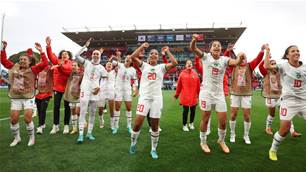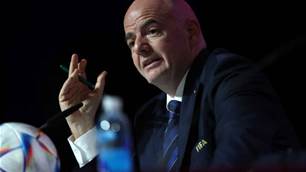FIFA president Sepp Blatter has given his strongest backing so far to goal-line technology saying: "If it works we will do it."
Although UEFA president Michel Platini will travel to Wales in March to try to prevent football's law-markers giving the go-ahead to trials of the goal-line systems, Blatter looks to have completely changed his position of 12 months ago.
The FIFA president said even though the International FA Board, the law-making body, was conservative by nature he was confident they would embrace goal-line technology if the systems were up to scratch.
Blatter told CNN: "My position is that if they work then we will do it.
"If there is one of these systems that is accurate and immediate, and also not too complicated, then I think goal-line technology has a good chance to be accepted.
"If it works the board will say 'Yes', even if they're conservative.
"Michel Platini is totally against any technical device because he's afraid that when we are in the goal-line technology we could go to the 18-yard line and we can go to the offside position or whatever, but for the time being we are talking about only goal-line technology."
The IFAB is made up of FIFA, who have four votes, and the four British associations, who have one vote each.
England and Scotland have been in favour of goal-line technology for some time, and the support of Blatter - who has performed a U-turn since Frank Lampard's infamous disallowed goal in the World Cup - means FIFA and the Wales and Northern Ireland associations are also likely to change their 'anti' stance and agree to experiments.
Meanwhile, Blatter said there was a more than 50% chance the 2022 World Cup in Qatar would be played during the winter - and insisted the fact many European leagues had winter breaks already would make it possible.
Blatter said: "This is possible because in the basic documents of the bid it is said that the FIFA executive committee can at any time make some amendments to the basic conditions.
"But if you ask me the percentage to play in winter it is definitely over 50%. It means this is more than just a probability to play in winter time because also for the spectacle, for the football and to protect footballers and also spectators, finally."
Blatter also defended FIFA against accusations that it was unfair on the other countries who bid for 2022 on the basis of it being a June/July tournament.
"You can say it's not fair, but the final decision has not yet been taken. But it would be unfair to the players to play in summer when there is a possibility to play in winter," he said.
"But all these big leagues, if you look now, some of them they now have a rest, a winter rest. Where there is a will you can change the international calendar for that year. This is a possibility because now you have 11 years to go."
International Olympic Committee president Jacques Rogge has called for talks with FIFA to ensure that a winter World Cup would not clash with the winter Olympics.
Rogge said: "This is a very hypothetical discussion. FIFA has not taken a decision to shift the 2022 World Cup to the winter months and the situation of the IOC is very clear: the IOC will organise the Winter Games in the winter - obviously - and the bracket we have is roughly the last week of January and the month of February.
"There is no way we can organise the Winter Games in December or March. I think it would be sensible, once a decision is being envisaged by FIFA, to sit around the table and see that it is not harmful for either partner."
Related Articles

Morocco blazing a trail for Arab women's football participation

FIFA blasted for OneLove armband threat













